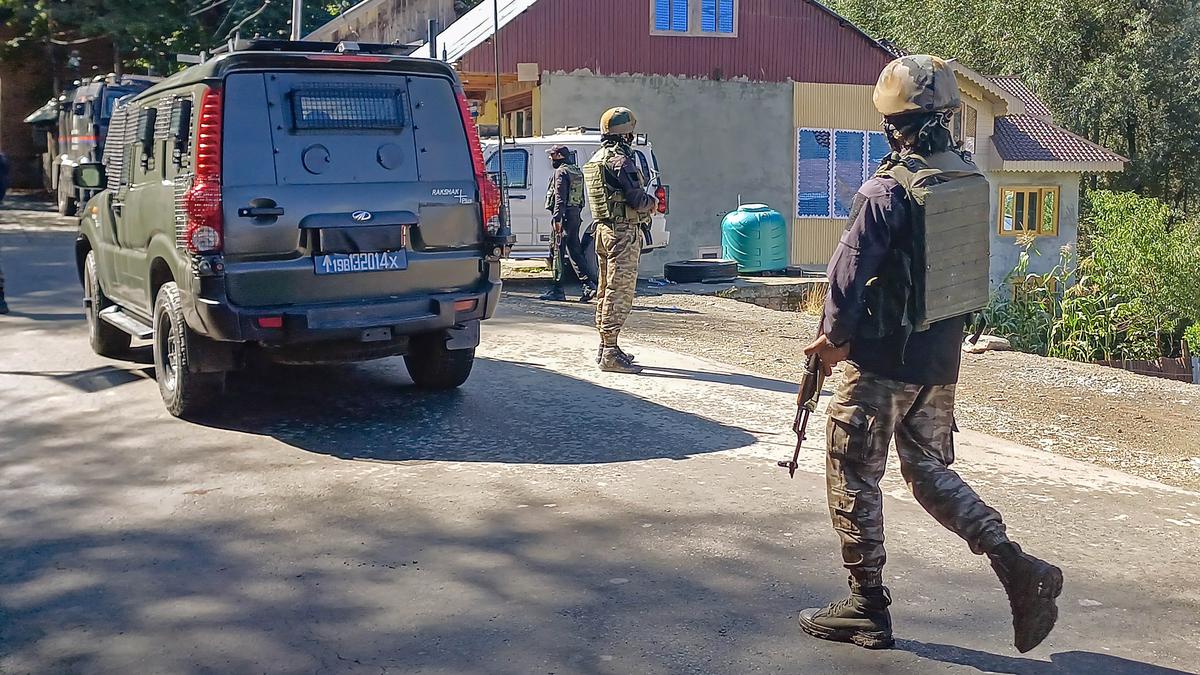
Day 7 of J-K operation: security forces comb through Anantnag forest
The Hindu
Security forces in Srinagar continue 7-day anti-militancy op in Anantnag's Gadole forest. 3 officers, 1 soldier killed. 2 bodies found, 1 identified. 2-3 terrorists believed trapped. Drones, helicopters used to survey area. Lt Governor vows to avenge slain personnel. DGP, GOC monitor op.
Security forces sieved through the dense forests of Gadole in Kashmir Valley's Anantnag district for the seventh day on Tuesday, one of Jammu and Kashmir's longest anti-militancy operations that has claimed the lives of three officers and a soldier.
Two bodies were found from the forest area on Monday. One was identified as Pradeep, the soldier killed by terrorists last week Wednesday. The identity of the other is yet to be ascertained, officials said.
Police officials have maintained silence on the operation for the last four days. They believe two to three terrorists are trapped in the forest area.
The operation started on Wednesday when Colonel Manpreet Singh, commanding officer, 19 Rashtriya Rifles, Major Ashish Dhonchak and Deputy Superintendent of Jammu and Kashmir Police Humayun Bhat were killed by terrorists. Pradeep went missing on the first day of the encounter and was believed to have been killed.
Officials had said earlier that drone footage showed a charred body near one of the terrorist hideouts destroyed during the operation. Security forces are using drones and helicopters to survey the dense forest area with several cave-like hideouts where terrorists are believed to have been holed up since Wednesday.
On Sunday, the security cordon was extended to the neighbouring Posh Kreeri area as a precautionary measure to ensure the terrorists don't slip into civilian areas.
Addressing a function here late on Sunday evening, Lt Governor Manoj Sinha said every drop of blood of the slain security personnel will be avenged and the terrorist handlers will have to pay a heavy price. "We have complete faith in our soldiers.... The entire nation stands in solidarity with the jawans," Sinha said.

“Writing, in general, is a very solitary process,” says Yauvanika Chopra, Associate Director at The New India Foundation (NIF), which, earlier this year, announced the 12th edition of its NIF Book Fellowships for research and scholarship about Indian history after Independence. While authors, in general, are built for it, it can still get very lonely, says Chopra, pointing out that the fellowship’s community support is as valuable as the monetary benefits it offers. “There is a solid community of NIF fellows, trustees, language experts, jury members, all of whom are incredibly competent,” she says. “They really help make authors feel supported from manuscript to publication, so you never feel like you’re struggling through isolation.”

Several principals of government and private schools in Delhi on Tuesday said the Directorate of Education (DoE) circular from a day earlier, directing schools to conduct classes in ‘hybrid’ mode, had caused confusion regarding day-to-day operations as they did not know how many students would return to school from Wednesday and how would teachers instruct in two modes — online and in person — at once. The DoE circular on Monday had also stated that the option to “exercise online mode of education, wherever available, shall vest with the students and their guardians”. Several schoolteachers also expressed confusion regarding the DoE order. A government schoolteacher said he was unsure of how to cope with the resumption of physical classes, given that the order directing government offices to ensure that 50% of the employees work from home is still in place. On Monday, the Commission for Air Quality Management in the National Capital Region and Adjoining Areas (CAQM) had, on the orders of the Supreme Court, directed schools in Delhi-NCR to shift classes to the hybrid mode, following which the DoE had issued the circular. The court had urged the Centre’s pollution watchdog to consider restarting physical classes due to many students missing out on the mid-day meals and lacking the necessary means to attend classes online. The CAQM had, on November 20, asked schools in Delhi-NCR to shift to the online mode of teaching.









